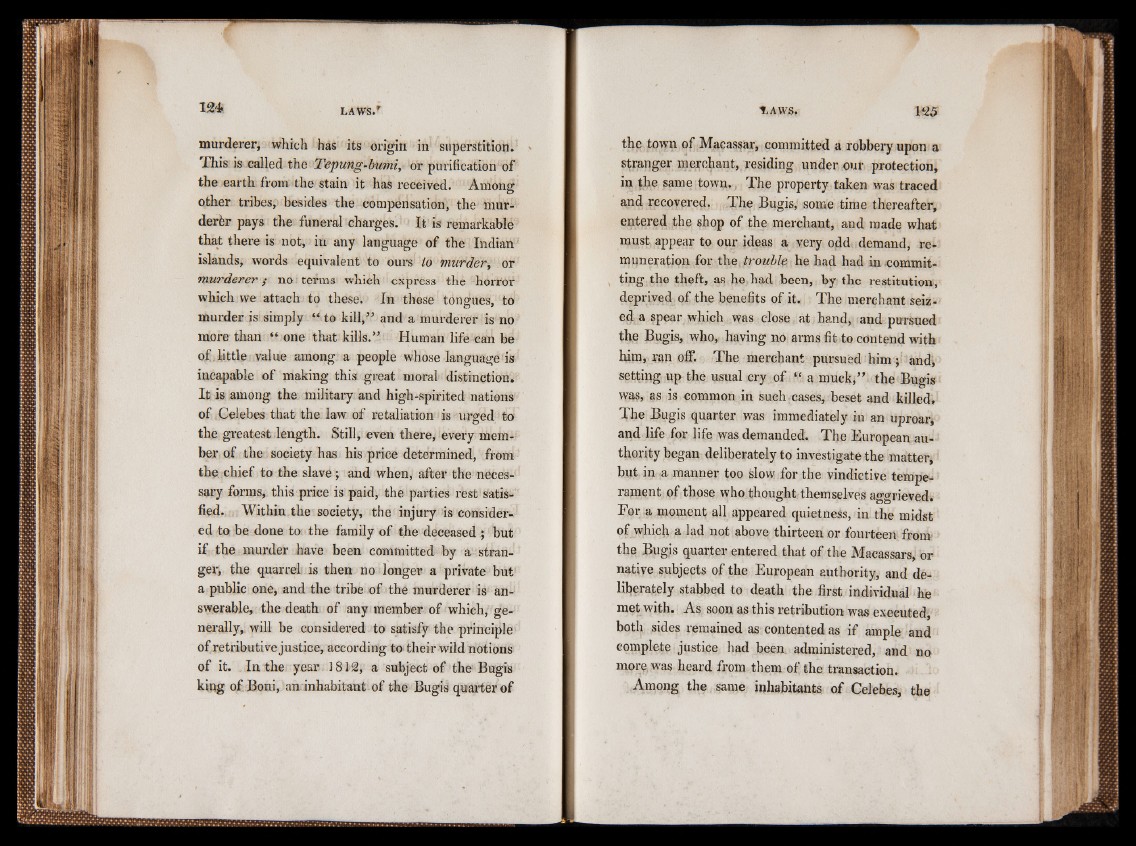
murderer, which has its origin in superstition.
This is called the Tepung-bumi, or purification of
the earth from the stain it has received. Among
other tribes, besides the compensation, the murderer
pays the funeral charges.1 It is remarkable
that there is not, in any language of the Indian
islands, words equivalent to ours to murder, or
murderer; no terms which express the horror
which we attach to these. In these tongues, to
murder is simply “ to kill,-5 and a murderer is no
more than “ one that kills.” Human life can be
of little value among a people whose language is
incapable of making this great moral distinction.
It is among the military and high-spirited nations
of Celebes that the law of retaliation is -urged- to
the greatest length. Still, even there, every member
of the society has his price determined, from
the chief to the slave ; and when, after the necessary
forms, this price is paid, the parties rest satisfied.
Within the society, the injury is considered
to be done to the family of the deceased ; but
if the murder have been committed by a stranger,
the quarrel is then no longer a private but
a public one, and the tribe of the murderer is answerable,
the death of any member of which, generally,
will be considered to satisfy the principle
of retributive justice, according to their wild notions
of it. In the year 1812, a subject of the Bugis
king of Boni, an. inhabitant of the Bugis quarter of
the town of Macassar, committed a robbery upon a
sfranger merchant, residing under our protection,
in the same town. The property taken was traced
and recovered. The Bugis, some time thereafter,
entered the shop of the merchant, and made what
must appear to our ideas a very odd demand, remuneration
for the, trouble he had had in committing
the theft, as he had been, by the restitution,
deprived of the benefits of it« The merchant seized
a spear which was close at hand, and pursued
the Bugis, who, having no arms fit to contend with
him, ran off. The merchant pursued him; and,
setting up the usual cry of “ a muck;” the Bugis
was, as is common in such cases, beset and killed.
The Bugis quarter was immediately in an uproar*
and life for life was demanded. The European authority
began deliberately to investigate the matter,
but in a manner too slow for the vindictive temperament
of those who thought themselves aggrieved.
For a moment all appeared quietness, in the midst
of which a lad not above thirteen or fourteen from
the Bugis quarter entered that of the Macassars, or
native subjects of the European authority, and deliberately
stabbed to death the first individual he
met with. As soon as this retribution was executed,
both sides remained as contented as if ample and
complete justice had been administered, and no
more, was heard from them of the transaction.
Among the same inhabitants, of Celebes, the